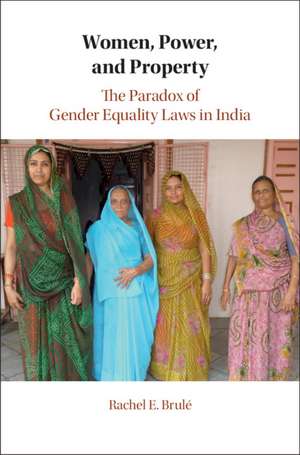Women, Power, and Property: The Paradox of Gender Equality Laws in India: Cambridge Studies in Gender and Politics
Autor Rachel E. Bruléen Limba Engleză Hardback – 21 oct 2020
| Toate formatele și edițiile | Preț | Express |
|---|---|---|
| Paperback (1) | 290.15 lei 22-36 zile | +27.58 lei 5-11 zile |
| Cambridge University Press – 13 apr 2022 | 290.15 lei 22-36 zile | +27.58 lei 5-11 zile |
| Hardback (1) | 888.25 lei 43-57 zile | |
| Cambridge University Press – 21 oct 2020 | 888.25 lei 43-57 zile |
Din seria Cambridge Studies in Gender and Politics
-
 Preț: 290.15 lei
Preț: 290.15 lei -
 Preț: 159.03 lei
Preț: 159.03 lei -
 Preț: 224.50 lei
Preț: 224.50 lei -
 Preț: 280.81 lei
Preț: 280.81 lei - 14%
 Preț: 695.12 lei
Preț: 695.12 lei -
 Preț: 240.74 lei
Preț: 240.74 lei -
 Preț: 284.81 lei
Preț: 284.81 lei -
 Preț: 203.34 lei
Preț: 203.34 lei -
 Preț: 206.58 lei
Preț: 206.58 lei
Preț: 888.25 lei
Preț vechi: 1032.84 lei
-14% Nou
Puncte Express: 1332
Preț estimativ în valută:
170.12€ • 175.27$ • 142.50£
170.12€ • 175.27$ • 142.50£
Carte tipărită la comandă
Livrare economică 24 februarie-10 martie
Preluare comenzi: 021 569.72.76
Specificații
ISBN-13: 9781108835824
ISBN-10: 1108835821
Pagini: 433
Ilustrații: 47 b/w illus.
Dimensiuni: 235 x 160 x 30 mm
Greutate: 0.75 kg
Editura: Cambridge University Press
Colecția Cambridge University Press
Seria Cambridge Studies in Gender and Politics
Locul publicării:New York, United States
ISBN-10: 1108835821
Pagini: 433
Ilustrații: 47 b/w illus.
Dimensiuni: 235 x 160 x 30 mm
Greutate: 0.75 kg
Editura: Cambridge University Press
Colecția Cambridge University Press
Seria Cambridge Studies in Gender and Politics
Locul publicării:New York, United States
Cuprins
1. Introduction; 2. A theory of political representation and economic agency; 3. Property and power: a political history of the Hindu joint family; 4. Where are the women? Investigating reform's roots; 5. The politics of property rights enforcement; 6. The long arm of resistance: refusal to care for parents; 7. Representation and violence: gender equality and sex selection; 8. Conclusion.
Recenzii
'In this powerful and subtle book, Rachel Brulé combs through an array of micro-level data for clues regarding the causes of and obstacles to gender inequality in India. One of her most stunning findings is that femicide actually increases when gender-equal inheritance laws are enforced – unless families are freed from the expectation that a daughter's property is forfeited to in-laws upon marriage. This book is a triumph of social science and a model for empirical scholarship on gender.' Frances McCall Rosenbluth, Yale University, Connecticut
'Brulé's study breaks new ground in exploring the economic effects of women's political representation. Her 'gatekeeper' theory shows how the presence of female officials in local governments in India shapes whether women are able to access their rights and improve their economic status. The result is a clear illustration that meaningful change for women requires shifts in social norms and practices – not just in formal legal reforms.' Melani Cammett, Harvard University, Massachusetts
'The study of property rights is undergoing a resurgence in political science. Rachel Brulé's stunning new book is at the forefront of this movement. Expertly combining the best tools of area studies and modern social science, Brulé shows how increases in women's political representation have altered social and property relations in India. Anyone interested in how low status groups can challenge a deeply entrenched status quo should read this book.' Timothy M. Frye, Columbia University, New York
'Brulé's study breaks new ground in exploring the economic effects of women's political representation. Her 'gatekeeper' theory shows how the presence of female officials in local governments in India shapes whether women are able to access their rights and improve their economic status. The result is a clear illustration that meaningful change for women requires shifts in social norms and practices – not just in formal legal reforms.' Melani Cammett, Harvard University, Massachusetts
'The study of property rights is undergoing a resurgence in political science. Rachel Brulé's stunning new book is at the forefront of this movement. Expertly combining the best tools of area studies and modern social science, Brulé shows how increases in women's political representation have altered social and property relations in India. Anyone interested in how low status groups can challenge a deeply entrenched status quo should read this book.' Timothy M. Frye, Columbia University, New York
Notă biografică
Descriere
Cutting-edge research from India finds bargaining power predicts whether electoral quotas can empower women to upend economic inequality.
